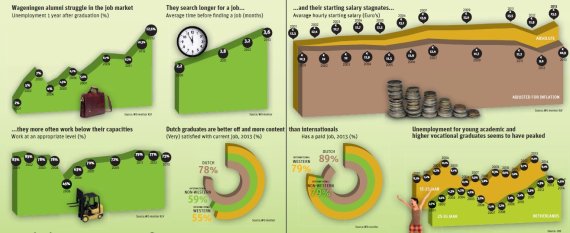Eighteen months after earning a degree, more than 12 percent of Wageningen’s graduates are still without work, reports alumni association KLV. This data is based on the recently published national WO Monitor. This is six times as many as ten years ago, when the jobless fi gure after 18 months was a negligible two percent. The decline has been especially rapid since the start of the credit crisis in 2007, the fi gures reveal. The malaise hasn’t been limited to those who can’t fi nd a job. Alumni who have done so, often work below their level and spent longer looking for their first job.
These job market figures are not unique to graduates of Wageningen UR. All young academics in the Netherlands are facing difficulties, according to the Study and Work 2014 report by SEO Economic Research in Amsterdam. However, differences between disciplines are evident. Graduates of Forestry and Nature Conservation, and International Development Studies, for example, are currently finding it diffi cult to get a job. For those in Plant Sciences and Food Technology, by contrast, job prospects are excellent. Plant breeding companies and food companies the world over are still eagerly seeking new staff.
Less salary
Economic developments mean that the average starting salary is slowly being eroded by inflation. Since 2007 the nominal hourly wage has remained more or less unchanged, but as a consequence of rising prices, real wages have dropped by more than ten percent. In salaries, too, large differences are evident. Alumni of Wageningen UR appear to earn less than students from other cities. But this is because a relatively large proportion of them become doctoral candidates, and the PhD route pays less well than a commercial job. Earnings also vary per knowledge sector. The SEO data show that the monthly starting salaries of arts and humanities students are hundreds of euros lower than those of graduates of the exact sciences and social sciences. The big earners, incidentally, are medical graduates.
International students
The most striking group in the WO Monitor is Wageningen UR’s foreign alumni. On average, they are less satisfi ed with their work. What’s more, they have a higher unemployment rate than Dutch alumni. All sorts of explanations could account for this. Perhaps they return to their home countries in a Dutch frame of mind and experience a culture clash? Or have do they have raised expectations of the future? While KLV can’t account for the differences, they do influence Wageningen’s statistics given that the university’s proportion of international students is ever-growing. Fortunately, this week also brought some good news. Data supplied by Statistics Netherlands show that the decline in unemployment among young graduates is a continuing trend.
Infographics: Pascal Tieman

